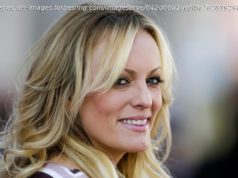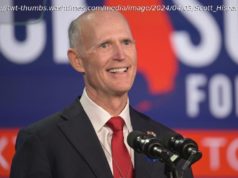Did payment to Stormy Daniels break the law?
WASHINGTON — The new revelations about President Trump and his lawyer’s payment to a porn star who says she had an affair with Trump have prompted campaign-finance watchdogs and some Democrats on Capitol Hill to renew their calls for a federal investigation.
On Monday, Common Cause filed updated complaints with the Federal Election Commission and the Department of Justice, arguing that a lawsuit filed last week by adult film actress Stormy Daniels demonstrates that a $130,000 payment to her broke election laws.
Another group, Citizens for Responsibility and Ethics in Washington (CREW), argues that Trump may have run afoul of rules requiring him to list his personal debts on a financial disclosure form.
“The whole set of circumstances raise a number of red flags about potential campaign-finance violations that merit further investigation,” said Richard Hasen, an expert on election law at the University of California-Irvine.
Here’s a look at the some of the potential areas of legal risk for Trump and his personal lawyer, Michael Cohen:
Under federal law, an individual could not donate more than $2,700 directly to Trump’s primary or general election campaign in 2016. A $130,000 payment would far exceed that limit.
But federal investigators would have to weigh whether the payment was, indeed, about influencing the election. In her lawsuit, Daniels says it was.
Daniels, whose legal name is Stephanie Clifford, said the affair began in 2006 and lasted until “well into” 2007. But she said Trump and Cohen “aggressively sought to silence” her in October 2016 — a decade after the alleged relationship began — to help “ensure he won the presidential election.”
Just days before the election, Daniels and Cohen signed what she calls a “hush” agreement. The money paid to Daniels flowed through Essential Consultants, a limited liability company Cohen created in Delaware several weeks before the election.
“It’s very strong evidence that this was about the election,” said Larry Noble, a former Federal Election Commission lawyer who is now senior director of the non-profit Campaign Legal Center. “If he was not running for election, they would not have done this.”
If the $130,000 payment came from Trump himself, the payment did not violate the law on contribution limits. Candidates can put unlimited amounts of their own money into campaigns.
But Trump’s campaign, and Cohen, could be in legal jeopardy if Cohen, or another unnamed party, was the source of the money.
More: Stormy Daniels offers to return $130,000 payment to Trump lawyer
More: President Trump’s lawyer secured a restraining order against porn star Stormy Daniels
Cohen has offered partial explanations in recent weeks about the source of the funds.
Earlier this year, he said he used his own money to “facilitate” the payment and was not reimbursed by either Trump’s company or the Trump campaign. Late last week, he offered more detail, saying he used a home-equity line of credit to pull together the money to pay Daniels.
Cohen’s statements have been silent on whether Trump — or anyone else — paid him back later. The Wall Street Journal, citing unnamed sources, reported last week that Cohen complained to friends after the election that he had not been reimbursed.
Neither Cohen nor his attorney, Lawrence Rosen, have responded to USA TODAY’s questions about possible reimbursement.
Federal law prohibits corporations and labor groups from donating directly to candidates. Companies and unions also are barred from “facilitating the making of contributions to candidates or political committees.”
Cohen, who served as a top lawyer with the Trump Organization in 2016, has said the company was not involved. But an email released late last week by Daniels’ attorney Michael Avenatti shows Cohen using a Trump Organization email address as he worked to arrange the payment to Daniels.
Cohen said he often used his work address for personal business. “I sent emails from the Trump Org email address to my family, friends as well as Trump business emails,” he told ABC News. “I basically used it for everything.”
Noble, the former FEC official, said regulators might not look askance at the mere use of the corporate email account. “If it was one or two emails, I would say ‘no,’ ” he said. But they might want to know whether it represents a larger role by the company, he added.
News recently emerged that another Trump Organization lawyer filed a secret legal document in February to block Daniels from talking about the alleged relationship. Company officials say that attorney, Jill Martin, acted in her personal capacity and that the Trump Organization is not representing any party in the Daniels’ dispute.
A variety of federal laws demand truth-telling when reporting information to the government.
Campaign finance watchdogs say the payment could violate election-disclosure laws, which require reporting of contributions and spending to help a candidate.
In addition, if Cohen was never reimbursed, the $130,000 payment should have appeared on Trump’s financial disclosure statement as an unpaid personal debt, according to CREW.
CREW filed complaints last week with Department of Justice and the Office of Government Ethics asking the agencies to investigate whether Trump “willfully failed to report this potential liability.”
That’s not clear.
The Federal Election Commission, down to just four commissioners from its normal six-person strength, typically deadlocks along party lines when it considers potential campaign finance violations.
Commissioners must vote to authorize a full investigation.
The Daniels’ case is one of two pending from Common Cause regarding payments to women who claimed trysts with Trump.
The other FEC complaint questions whether a reported $150,000 payment in August 2016 from the parent company of The National Enquirer to former playboy model Karen McDougal was intended to “buy and bury” the story of her alleged affair with Trump.
An FEC official declined to comment on the complaints, citing a provision of federal law that bars the agency from discussing pending cases.
Election law experts say recent history also could make the Department of Justice wary of the case.
In 2012, Justice Department prosecutors failed to convict former Democratic presidential contender John Edwards on campaign-finance violations after his supporters made $1 million in secret payments to conceal a pregnant mistress.






